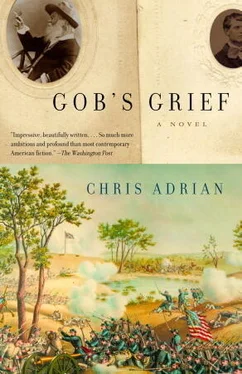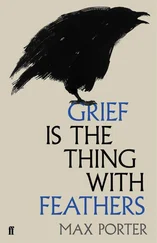With his head in his camera, Frenchy was blind to danger. It was Will’s job to keep an eye out for sneaking Rebels. A truce had been called, to gather the dead and wounded, but Will did not trust them to keep it. A profusion of boys was strewn on the ground, none of them closer than a hundred yards to the stone wall against which Burnside had thrown them.
“Did you ever think you’d be a photographer?” Frenchy asked from under the camera hood, saying the word with great reverence.
“No,” said Will. When he was a boy, he had wanted to become a sailor, because he and Sam had been great admirers of Typee , and had imagined a scummy pond behind their house to be the wide green bay of Nukuheva. Later, Will thought he would be a doctor, for no good reason except that to doctor was not to farm like his father. Now, he thought he might have been growing up all this time merely to be a brick in a wall of corpses.
Frenchy pulled his head from the camera and made a confession to Will, to whom he was beginning to show something like affection. It was his hope, he said, to take a picture of a soldier at the precise moment of his death, because he believed the departing soul, invisible to a human eye, could be seen by the camera. Soon after his confession, Frenchy found a squirmer on the cold field, but by the time he’d moved the camera and made it ready, the boy was dead.
Will was much in demand that whole day through. In the late afternoon, when the light had grown too bad for taking pictures, he took up a pick to open the frozen ground for graves, and worked at it till his arms and shoulders burned. He wanted to weep from exhaustion, but there were always more dead to bury, some of them naked because ill-clad Rebs had crept forth from the lines to steal their clothes in the night. When he stopped working, he could barely raise his arms to feed himself. He found Frenchy in a hospital tent, with his camera set up by the bedside of a blond-headed boy who looked for sure to be a goner. Will’s hands were a mess of blisters. Frenchy gave him a plate to develop, but he dropped it, which earned him a cursing so thorough Will had to resist an urge to knock the little man down. Frenchy nearly got ejected from the tent, for all that he brought out his omnipresent letters and waved them like a little set of battle colors. He took up his vigil again, and sent his assistant away.
Will went back to Company D. They’d been held in reserve for most of the previous day, having seen just a smidgen of action when they were called up in support of a battery below Fredericksburg. Despite the shells bursting over their heads, their only casualty was a boy who had been overcome with excitement and accidentally shot himself in the knee. Jolly was having his dinner with a few other members of the Leper Mess. A tall thin fellow named Lewy Greeley, who was unpopular on account of his incessant proselytizing, was lamenting his fate. “This is the worst regiment ever,” Lewy said, stabbing beans with a spoon. “We see no good action and are overrun with godlessness. I think I will go off and join the 110th.” He meant the 110th Illinois, a regiment composed entirely of Methodist ministers. He nattered on about them incessantly, about their somber uniforms and pious behavior: they sang booming hymns as they loaded, primed, and fired. God was with them in precisely the way he was not with this here assembly of lawyers and farmers.
“I’ll cut you a new mouth to whine with, if you don’t shut up,” said Jolly, who was not known for making idle threats. Will sat back on his heels, picked out hot beans with his fingers, and raised them slowly to his mouth. “Did you see the sky last night, Tiny?” Jolly asked him.
“I did,” Will said. There had been a fantastic display, the night after the battle. The northern lights had come south to blaze in the sky above the Union right. Will had lain on his back to watch, holding to his eye a cracked lens pilfered from the wagon, thinking it would be fine to take a picture of such a thing as that festive sky.
“Do you suppose it was a sign? Do you suppose it was God waving his hanky for the Rebs? Perhaps it is our purpose to lose.”
“We were good Christians today, then,” said Will.
“No,” said Lewy Greeley. “Not ever.”
A catalogue of expressions — fear, sadness, rage, surprise, tenderness, even what appears to be a broad smile, this last on a head connected only by strings to the neck it once rode upon. A catalogue of parts — arms and legs, trunks and bellies, ears and noses, a flat section of skull. The hair is still attached, but the rest of the body is nowhere to be seen. It might be a muskrat, crouched in the grass. The whole west wall is a catalogue of parts and faces.
In May of ‘63, Will drifted across the Rappahannock with a few other members of Company D. Lewy Greeley was there, and so was Jolly. It was just before dawn. They were going over to clear out some intractable sharpshooters who were making it impossible to lay down pontoons for a bridge. Lewy was twitching with excitement. Months of idleness in winter camp had made him a nervous creature. A few times, at night on picket duty, he had fired blindly at the enemy lines. That morning, he could barely contain himself. Inhospitable Rebs were firing at them already, though their visit was supposed to be a surprise. Lewy kept trying to stand up in the boat. A wag in a neighboring boat had stood up and shaken his ass at the Rebs, then crouched down again without taking a hit. “Let go, you big ape!” Lewy said to Will, tearing his sleeve free of Will’s fingers.
“Stay down, Lewy,” said Jolly. “It’s positively unhealthy up there.”
Lewy paid him no mind. He stood up in the boat and said, “Look at me! I am a marine! ” A bullet took him in the head. He fell down and was still, and made no noise, but his blood rushed out from him, and pooled around their knees.
“Ah, Lewy,” said Jolly. “You were too much of a bother for this world.”
The Rebs offered up a few more volleys, but left the bank with hardly any fight at all. Will sat by a fire, ostensibly guarding the engineers as they worked, but really he was looking at Lewy’s body, wrapped up in a coat upon the riverbank. He wished he had a picture of him, because he had discovered he could better empathize with a picture of a dead boy than with the dead boy himself. Looking at the pictures he could wonder, What did the boy see as he died, where were his thoughts? If he had a picture of Lewy’s body he might have wondered if Lewy, in the half-second during which he took his bullet, thought of his Methodist regiment, and hoped to join them in Heaven though he could not join them on earth. If he could have chosen a word and spoken it as he died, what would it have been? Did a color fill his mind as he expired? With a picture, Will might have tried to imagine how it felt to be wounded like Lewy, he might have held a hand up to touch his own pulse beating in his temple. As it was, he was filled with a stony, gray feeling, and found he was already forgetting what Lewy looked like.
Lewy Greeley, carefully arranged. He looks noble in a way he never did in life. He lies with his arms folded over his chest, his little face serene and pretty in a patch of morning sunlight. He might be dreaming. Will put him on the north wall, with all the other boys from Company D.
“I’ve failed!” Frenchy said, sitting by his wagon a few days after Lewy’s death, after Company D and the rest of the Army of the Potomac had scurried back over the Rappahannock in the wake of the great disaster at Chancellorsville. Frenchy had been cross because the wounded, dying, and dead were left on the other side of the river where he could not photograph them. He had retreated to a hospital tent and taken up a post next to a boy who was clinging to life despite the amputation of both his legs, and repeated assaults by the bloody flux. In his delirium, the boy thought Frenchy was his mother. Previously, Frenchy had wandered away for food or drink, or fallen asleep, at the critical moment, but this boy wailed piteously if he left his side, so he was there for the death. “Miserable, hideous failure!” Frenchy said.
Читать дальше












